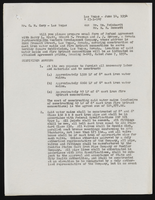Search the Special Collections and Archives Portal
Search Results
Ethel Smith and Barbara Carter McCalister oral history interview
Identifier
Abstract
Oral history interview with Ethel Smith and Barbara Carter McCalister conducted by Claytee D. White on March 3, 2021 for African Americans in Las Vegas: a Collaborative Oral History Project. Barbara Carter and Ethel Smith grew up on the Westside in the 1950s, both born in the late 1940s. They attended the Westside School. Their memories of the city are colorful, vibrant, and clear. They loved school and excelled in the assigned work. After high school, before their chosen careers, both tried work as a maid and found the sexual harassment a real challenge. Their memories of entertainment, fun, customs, and business locations on Jackson Avenue and the surrounding Black business community, related on their walk down memory lane, provided good historical information. Barbara Carter entered banking at Valley Bank and Ethel Smith, the casino industry, at a time when the MOB ran Las Vegas. Their recollections remind us that businesses operated differently and these women were there to witness it. Subjects discussed include: Westside, Jackson Ave, MOB, La Concha Motel, Berkley Square, Valley Bank, Caesars Palace, Ash Resnick, Jackson Hotel.
Archival Collection
Barbara Jean Drew oral history interview
Identifier
Abstract
Oral history interview with Barbara Jean Drew conducted by Claytee D. White on May 17, 2021 for African Americans in Las Vegas: a Collaborative Oral History Project. Barbara Drew is the Dean of the Academy for Ministers, teaches Bible study, and performs other spiritual work at New Jerusalem Worship Center. Drew migrated to Las Vegas from Fortune Fork, Louisiana, just two miles outside the city limits of Tallulah.
This interview covers life in the Black community beginning when Drew arrived in 1961. She spoke about the importance of businesses like the Brown Derby, Hamburger Heaven, and the Town Tavern that hosted jazz on Sunday afternoons with a dance floor that she enjoyed. She discussed her first job running American Linen, a Dry Cleaners owned by Phil Shapiro; Shapiro mentored Drew, teaching her about business operations, purchasing property for her family, bookkeeping, and the importance of having a bank account. She also spoke of a neighborhood where neighbors helped neighbors and opportunities that flourished throughout the Black community. Subjects discussed include: Jackson Ave, Town Tavern, New Jerusalem Worship Center, Kasper Park, Berkley Square, and Phil Shapiro.
Archival Collection
Jean S. Childs oral history interview
Identifier
Abstract
Oral history interview with Jean Childs conducted by Claytee White on December 02, 2013 for the African Americans in Las Vegas: a Collaborative Oral History Project. Jean recalls the culture shock of segregation and racism her family encountered upon arriving in Las Vegas, Nevada from California in 1963. Jean spoke about how her mother was a role model for her, who carved a path of fighting for the underprivileged, growing the Head Start program in Las Vegas.
Archival Collection
Audio recording clips of interview with Rev. Claude H. and Stella Parson by Maurice R. Page, February 26, 1977
Date
Archival Collection
Description
Two audio clips from an interview with Stella and Rev. Claude H. Parson conducted by Maurice R. Page on February 26, 1977. As educators, the Parsons discuss the integration of schools in Las Vegas. In the clips, Rev. Parson discusses early housing development in West Las Vegas, church management, and equal opportunity progress.
Sound
Wright, Johnie B.
Johnie Beatrice Sparkman Wright was born on June 8, 1939 in McNary, Arizona. She moved to Las Vegas, Nevada in 1941. Johnie is a retired nurse's aide who received her training at Rose De Lima Hospital in 1968. As a native Las Vegan she recalls stories of her youth: Brownies, dancing at Silver Slipper and not being allowed on Jackson Street. She remembers moving to Berkley Square in 1959 and what it was like to live there.
Person

Transcript of interview with Jarmilla McMillan-Arnold by Claytee D. White, October 7, 2010
Date
Archival Collection
Description
Jarmilla McMillan-Arnold’s father, Dr. James B. McMillan, was the first black dentist in the state of Nevada. Dr. McMillan’s colleagues consisted of Dr. West, the first black medical doctor in the state, and Dr. Ice, the first black surgeon in Nevada. This interview highlights and archives the solid foundation upon which Nevada’s black community was built. Jarmilla recalls early memories of growing up as the daughter of Las Vegas NAACP president Dr. McMillan. She was born in Detroit, Michigan, to a Caucasian and Indian mother who was a professional dancer. Jarmilla’s parents separated when she was very young and as a result she was raised by her paternal grandmother who owned a restaurant in Pontiac, Michigan. Jarmilla describes her grandmother as being well-known and highly regarded in the community where she maintained her business. Jarmilla attended Catholic schools in Detroit, Pontiac, and Las Vegas. Having moved to Las Vegas with her father, Jarmilla’s narrative offers keen insigh
Text
Marshall, Agnes C., 1931-
Agnes Marshall was born February 4, 1931 and grew up on a farm in Ferriday, Louisiana raised by her grandparents. At the age of 15, Marshall moved to Salt Lake City, Utah with her mother and later found herself settling in Las Vegas, Nevada in 1951.
Person



